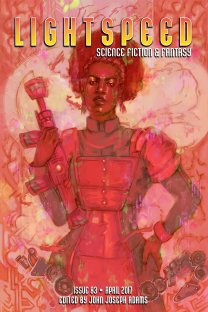“Infinite Love Engine” by Joseph Allen Hill
Reviewed by Victoria Silverwolf
Editor John Joseph Adams offers a pair of science fiction stories that feel like fantasy, as well as two fantasy stories that feel like science fiction, in the electronic pages of his award-winning magazine. It’s interesting to note that two stories, one of each genre, have very similar themes, while the other two could not be more different.
“Infinite Love Engine” by Joseph Allen Hill is a lightning-paced tale of a cyborg sent on a mission to save the universe from a thing which causes all lifeforms to love it. Along the way she encounters a wide variety of bizarre beings, from a dangerous “braincube” to a planet-sized entity known as the Drowning King. Narrated in a highly informal style, this wild and woolly space opera doesn’t seem intended to be an out-and-out comedy, although it’s hard to take it too seriously with characters called Beeblax and Zarzak. Despite a setting which must be the far future, there’s a lot of modern slang, and even mention of things which are already out of date, such as a cassette tape player and disco music. The heroine wields a device known as a Sister Ray, which is not only a weapon but can change anything into anything else. Such cartoon superpowers make this cosmic adventure seem more like a story of mythical heroes and monsters. The reader never believes in anything that is happening, but may get a kick out of the ride.
Much more intimate is “Seven Permutations of My Daughter” by Lina Rather, although its scientific content is no less fantastic. The narrator is a physicist who has built a device which allows her to journey to parallel universes. For story purposes, this might as well be magic. She uses it in an attempt to find a world where her estranged, heroin-addicted daughter is safe and happy. The desire to change our lives is one to which we can all relate, and the story has strong emotional power.
“Remote Presence” by Susan Palwick seems at first to take place in our own mundane reality. We soon find out, however, that the characters all accept the fact that ghosts are real, and that sometimes they must be helped—or forced—to move on to the next world. The protagonist is a hospital chaplain. In addition to his many other duties, he also has to deal with an elderly woman who has died in the emergency room and who continues to haunt it, only because she is lonely and wants someone to talk to. He manages to move her spirit into a mobile remote sensing device, allowing him to control her movements, but he still has to figure out a way to convince her to leave the physical world, particularly now that inspectors from the Joint Commission on Accreditation of Healthcare Organizations are touring the hospital. (Anyone who has ever worked in a hospital will understand the stress caused by a visit from the JCAHO.) The story could easily be changed into science fiction by using the familiar theme of downloading a person’s consciousness into a computer, but it probably works better as fantasy. The protagonist is appealing, and his struggle to find a solution to his dilemma before the inspectors shut down the hospital for violating the regulations against ghosts is sure to win the reader’s sympathy.
“Maybe Look Up” by Jess Barber is also set in the modern world, with a single difference. The main character believes that it is possible to change one thing in her past, in order to make the present better. Over several years, with the help of a close friend, she keeps a list of events which she might choose to alter. The theme is very similar to that of “Seven Permutations of My Daughter,” and the notion of changes in the past resulting in consequences for the present is a familiar one from many science fiction stories about time travel. The conclusion may make the reader wonder if this story should be thought of as mainstream fiction. The use of literary techniques such as second person present tense narration and dialogue without quotation marks might strike the reader as pretentious, but the author is skilled at creating fully realized characters.
 Lightspeed #83, April 2017
Lightspeed #83, April 2017